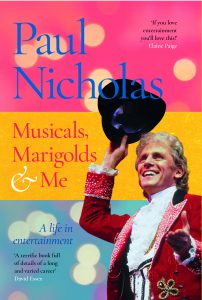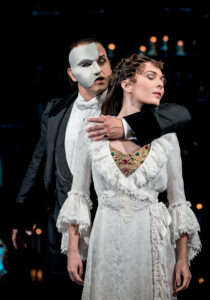A story of an impressive showbiz career
★★★
 If you’re fascinated by show business, you’ll definitely want Musicals, Marigolds & Me, the new autobiography by Paul Nicholas, in your Christmas stocking.
If you’re fascinated by show business, you’ll definitely want Musicals, Marigolds & Me, the new autobiography by Paul Nicholas, in your Christmas stocking.
He’s already given us one slice of his life back in 1999, so his latest contribution concentrates on his career as opposed to his personal life, and in particular brings up to date with his 21st century life producing shows, touring in musicals, and his newfound stardom as one of the inhabitants of TV’s Real Marigold Hotel.
Since the latter is what many people now know him for, Paul sensibly starts with a few stories about his experiences on the programme, which I’m sure will amuse the show’s many fans. I haven’t seen the show but this did tempt me to watch it.
The most interesting part of the book, for me anyway, is the behind-the-scenes story of what it’s like to be a producer. In particular, his greatest successes Grease and Saturday Night Fever.
During my time in theatre management, I worked with Paul on a number of occasions and his book is very like himself: he rarely boasts, he doesn’t upset anybody, and he keeps most of his life private. And this is where the book falls down a bit. You get very little sense of what it feels like to be a star or to be in the middle of the world of show business.
After many little stories about making the Marigold programmes, there are also very few anecdotes about the rest of his career. And when he does come up with a story, he doesn’t exaggerate or add comedy, as some would, to make them more memorable. He certainly doesn’t reveal any secrets, sticking religiously to the unwritten rule that what happens backstage stays backstage. I’m not saying I was looking for juicy scandals and salacious gossip, just some colourful stories about the people and things that happened behind the scenes.
We learn about his progress in the world of pop music which included some chart hits, and touring with the likes of Screamin’ Lord Sutch and Del Shannon and The Who. I mean, how can you tour with The Who and not have a colourful story or two? Has he really nothing to report on meeting David Bowie beyond ‘he didn’t strike me as a happy-go-lucky person’?
When he embarks on his lengthy career as a musicals performer which includes starring roles in the original London productions of Jesus Christ Superstar and Cats. This section of the book reads like a Wikipedia entry: I did this, then I did that; I met this person then I met that person. Even though you may not get much feeling for what the life or even the people were like, you do see how show business works, and Paul shares some of what he has learned. For example, ‘ If you try and short-change the public, they will catch you out.’
When he gets into producing, the book goes up a gear. He is rightly proud of his achievement in this field, including two outstanding West End musicals Grease and Saturday Night Fever. It started in 1990, when he teamed up with David Ian to put together a touring production of the Joseph Papp version of The Pirates Of Penzance. There are many insights into the difficulties of raising money, casting and marketing (I never knew he was responsible for the iconic Grease logo).
When he had the idea of reviving Grease in 1993, he dumped the original theatre show and transformed it into a stage version of the film by incorporating new songs that featured in the movie. It proved immensely popular, especially with young people.
In 1998, he co-produced the first stage version of Saturday Night Fever. The details of his contribution to making the show the success it was, from the original idea to stage the show, the negotiations with Robert Stigwood who owned the rights, his rewriting of the script, his discovery and mentoring of the leading man Adam Garcia, the difficult decision to invest his own money, will fascinate anyone who is interested in the business side of show business.
But still no juicy gossip. After his huge success as a co-producer of Saturday Night Fever in the West End, it’s clear he was annoyed that Robert Stigwood went on to produce the show on Broadway without him. But he continues to talk well of him. I think part of the reason may be that Paul is a very nice man who genuinely doesn’t want to be unkind to anybody, even someone no longer with us.
One thing that emerges very clearly from his book is the basis of his success. He is of course talented, but so are many entertainers. He is certainly good looking and charming, and he has a good stage presence. He was a born singer but he had to learn to act, and to dance. Although he was never the greatest at any of these, what he did do was work hard. He is a supreme example of the saying that success is 1% inspiration and 99% perspiration. His work rate is hugely impressive. For Singin’ In The Rain, he had to learn to dance well enough to play a role made famous by Gene Kelly. When he starred as Barnum, he learned juggling, unicycling, trampolining and tightrope walking. He certainly deserves his success.
Paul displays his gentle sense of humour, as when he says that, even as an old man, he still has fans, including a stalker. ‘I just have to walk very slowly,’ he writes.
And that’s typical of Paul Nicholas. It is no surprise that he is growing old gracefully. By dint of talent, determination and hard work, he has had an impressive career, but all with good grace and self effacement. And that’s what you get in his latest autobiography.
Musicals, Marigolds & Me is published by Fantom Publishing
Paul was given a copy of the e-book to review
Watch this review on the YouTube channel One Minute Theatre Reviews
